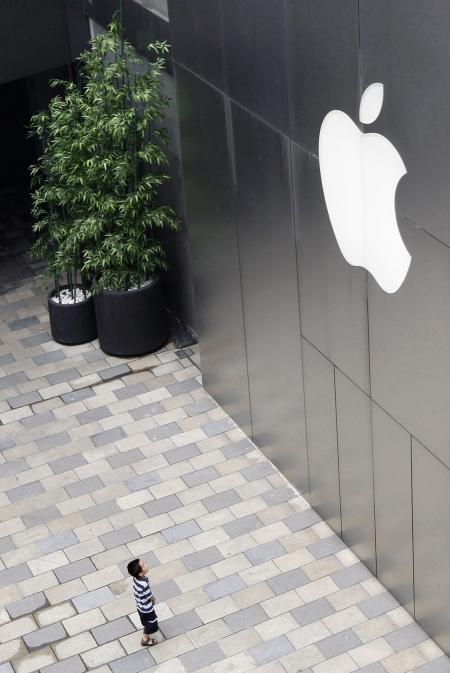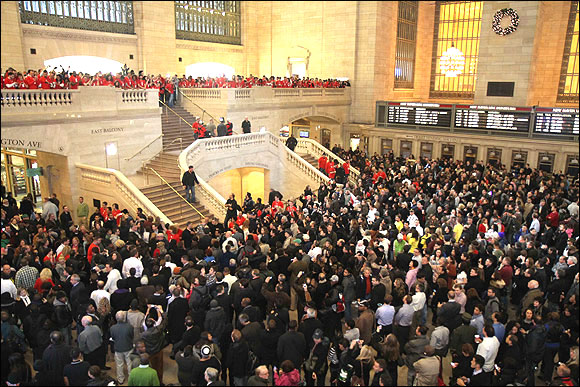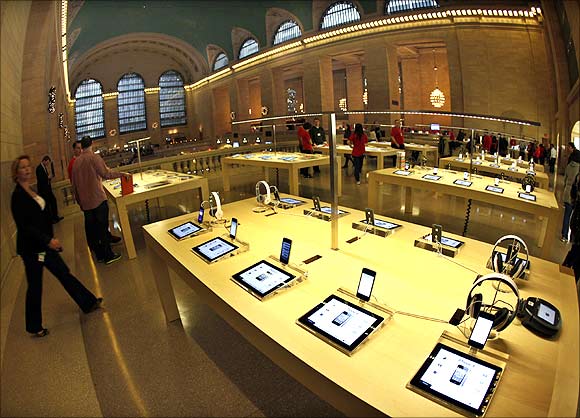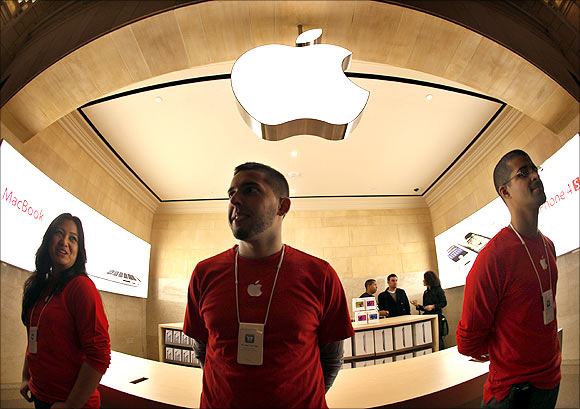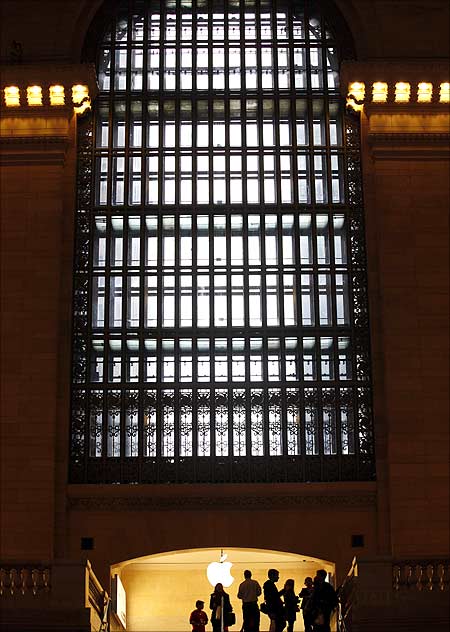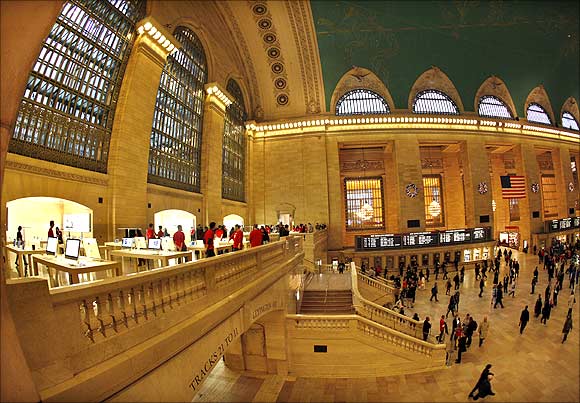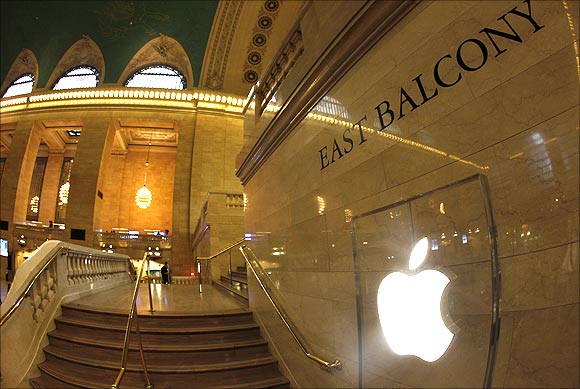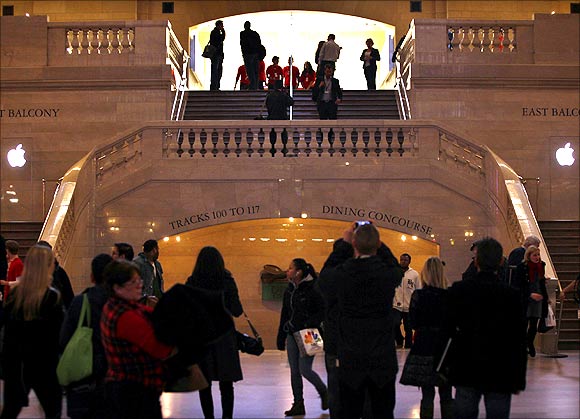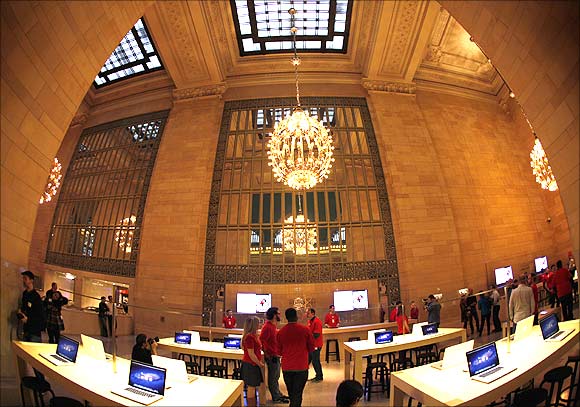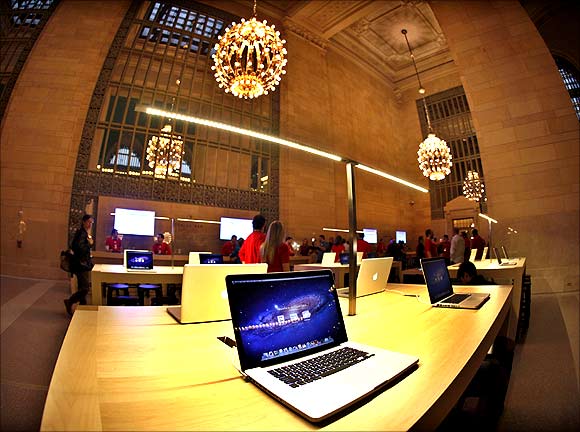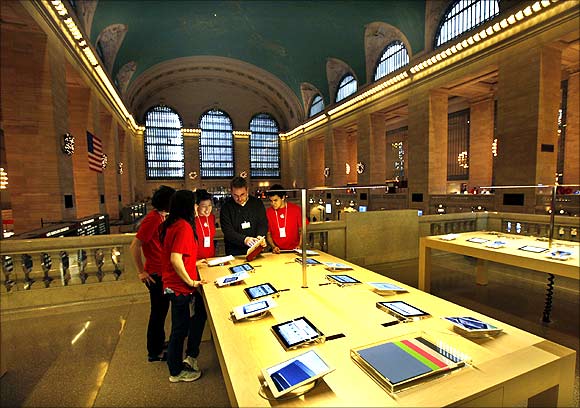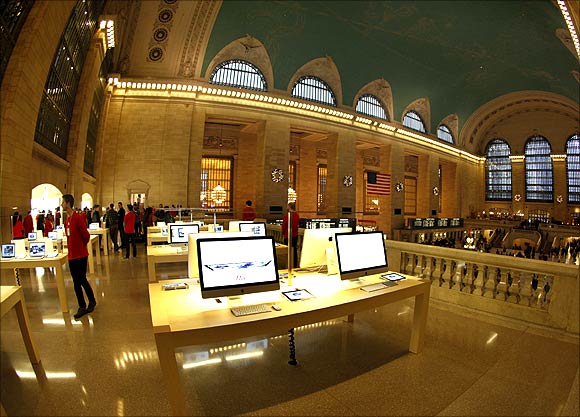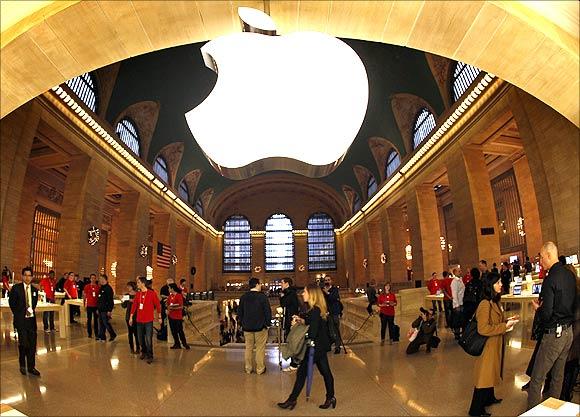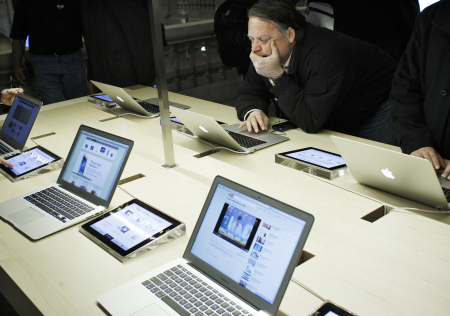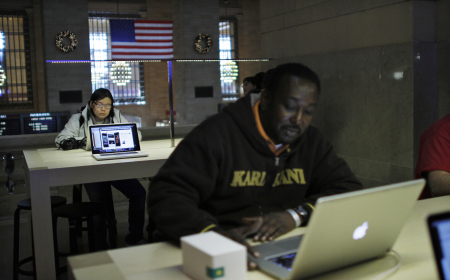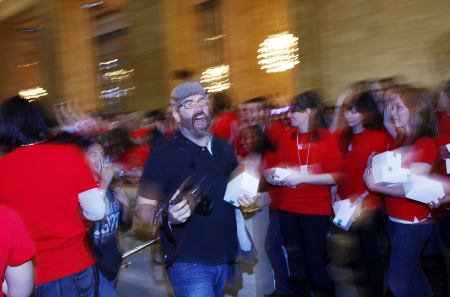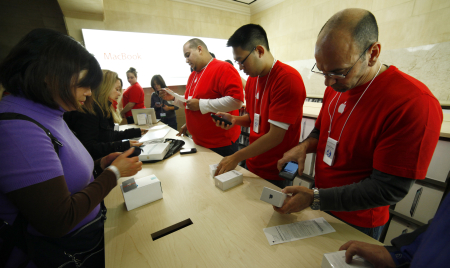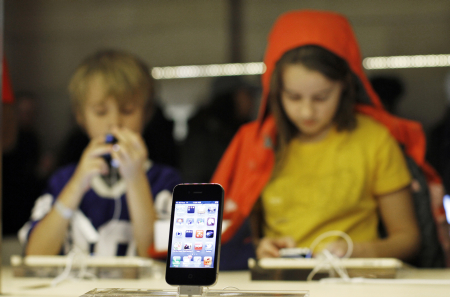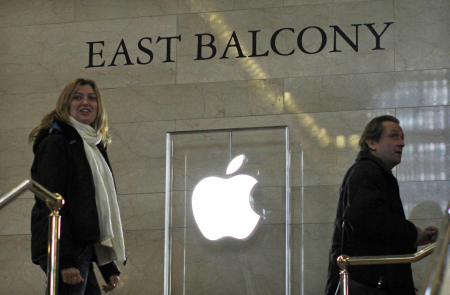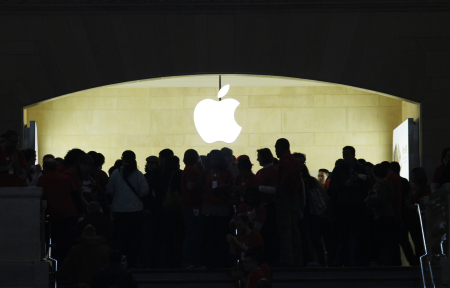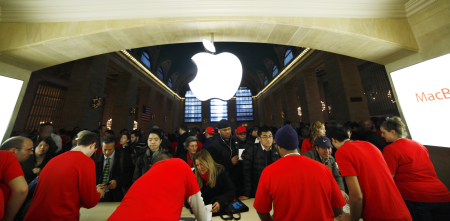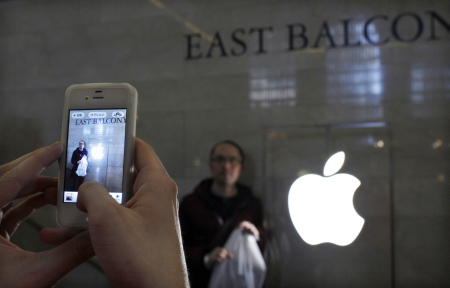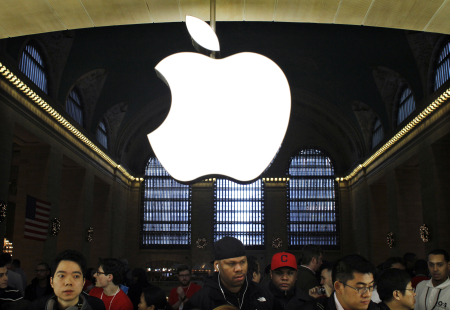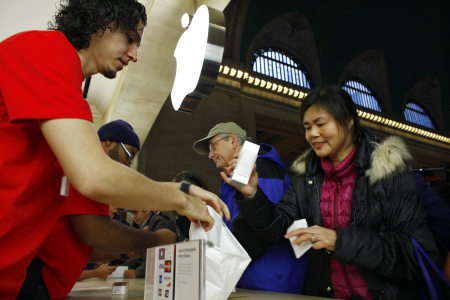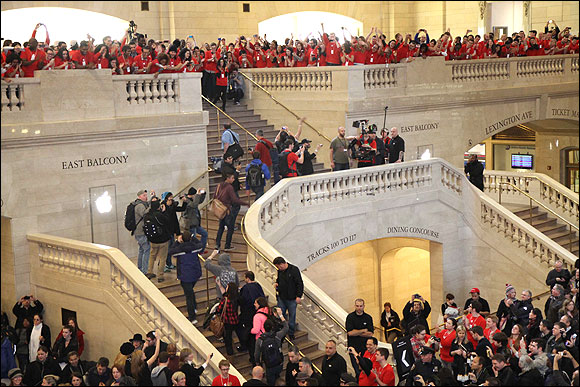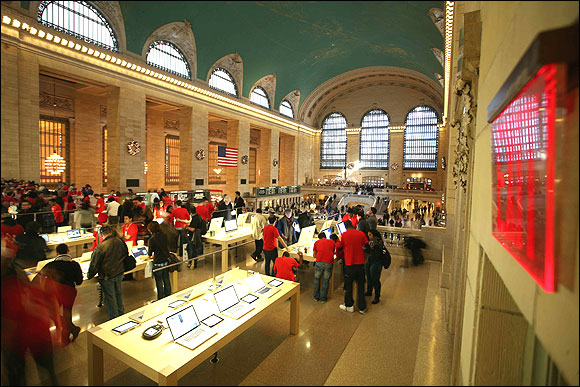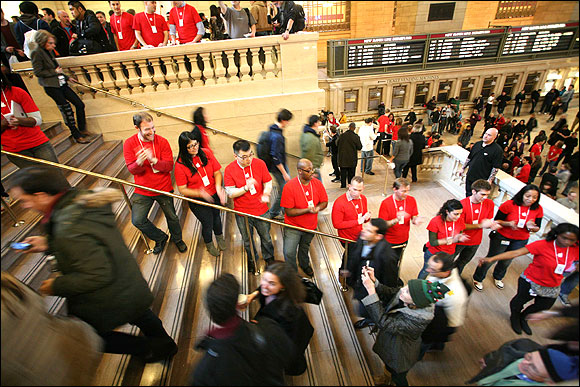 | « Back to article | Print this article |
Stunning photos of Apple's new store in New York
Apple opened its latest retail store in New York's historic Grand Central Terminal to hundreds of eager shoppers.
The newest store - one of Apple's largest at 23,000 square feet - brings the total tally of its outlets to more than 300 worldwide.
Let us have a look at the new store.
Click NEXT to see more...
Stunning photos of Apple's new store in New York
Apple is an American multinational corporation that designs and markets consumer electronics, computer software, and personal computers.
Click NEXT to read more...
Stunning photos of Apple's new store in New York
The company's best-known hardware products include the Macintosh line of computers, the iPod, the iPhone and the iPad.
Click NEXT to read more...
Stunning photos of Apple's new store in New York
Apple software includes the Mac OS X operating system; the iTunes media browser; the iLife suite of multimedia and creativity software; the iWork suite of productivity software; Aperture, a professional photography packa#8805 Final Cut Studio, a suite of professional audio and film-industry software products; Logic Studio, a suite of music production tools; the Safari web browser; and iOS, a mobile operating system.
Click NEXT to read more...
Stunning photos of Apple's new store in New York
As of July 2011, the company operates 357 retail stores in 10 countries, and an online store where hardware and software products are sold.
Click NEXT to read more...
Stunning photos of Apple's new store in New York
As of September 2011, Apple has recently been the largest publicly traded company in the world by market capitalization, and the largest technology company in the world by revenue and profit.
Click NEXT to read more...
Stunning photos of Apple's new store in New York
Established on April 1, 1976 in Cupertino, California, and incorporated January 3, 1977, the company was previously named Apple Computer, Inc, for its first 30 years, but removed the word "Computer" on January 9, 2007, to reflect the company's ongoing expansion into the consumer electronics market in addition to its traditional focus on personal computers.
Click NEXT to read more...
Stunning photos of Apple's new store in New York
As of September 2010, Apple had 46,600 full time employees and 2,800 temporary full time employees worldwide and had worldwide annual sales of $65.23 billion.
Click NEXT to read more...
Stunning photos of Apple's new store in New York
For reasons as various as its philosophy of comprehensive aesthetic design to its distinctive advertising campaigns, Apple has established a unique reputation in the consumer electronics industry.
Click NEXT to read more...
Stunning photos of Apple's new store in New York
This includes a customer base that is devoted to the company and its brand, particularly in the United States.
Click NEXT to read more...
Stunning photos of Apple's new store in New York
Fortune magazine named Apple the most admired company in the United States in 2008, and in the world in 2008, 2009, 2010, 2011.
Click NEXT to read more...
Stunning photos of Apple's new store in New York
Apple was also branded as the most valuable public limited company, pushing past Exxon.
Click NEXT to read more...
Stunning photos of Apple's new store in New York
The company has however received widespread criticism for its contractors' labour, environmental and business practices.
Click NEXT to read more...
Stunning photos of Apple's new store in New York
Apple was established on April 1, 1976 by Steve Jobs, Steve Wozniak, and Ronald Wayne, to sell the Apple I personal computer kit.
Click NEXT to read more...
Stunning photos of Apple's new store in New York
They were hand-built by Wozniak and first shown to the public at the Homebrew Computer Club.
Click NEXT to read more...
Stunning photos of Apple's new store in New York
The Apple I was sold as a motherboard (with CPU, RAM, and basic textual-video chips) - less than what is today considered a complete personal computer.
Click NEXT to read more...
Stunning photos of Apple's new store in New York
The Apple I went on sale in July 1976 and was market-priced at $666.66 ($2,572 in 2011 dollars, adjusted for inflation.)
Click NEXT to read more...
Stunning photos of Apple's new store in New York
Apple was incorporated on January 3, 1977, without Wayne, who sold his share of the company back to Jobs and Wozniak for $800.
Click NEXT to read more...
Stunning photos of Apple's new store in New York
Multi-millionaire Mike Markkula provided essential business expertise and funding of $250,000 during the incorporation of Apple.
Click NEXT to read more...
Stunning photos of Apple's new store in New York
The Apple II was introduced on April 16, 1977, at the first West Coast Computer Faire.
Click NEXT to read more...
Stunning photos of Apple's new store in New York
It differed from its major rivals, the TRS-80 and Commodore PET, because it came with character cell-based colour graphics and an open architecture.
Click NEXT to read more...
Stunning photos of Apple's new store in New York
While early models used ordinary cassette tapes as storage devices, they were superseded by the introduction of a 5 1/4 inch floppy disk drive and interface, the Disk II.
Click NEXT to read more...
Stunning photos of Apple's new store in New York
The Apple II was chosen to be the desktop platform for the first "killer app" of the business world - the VisiCalc spreadsheet programme.
Click NEXT to read more...
Stunning photos of Apple's new store in New York
VisiCalc created a business market for the Apple II, and gave home users an additional reason to buy an Apple II -compatibility with the office.
Click NEXT to read more...
Stunning photos of Apple's new store in New York
By the end of the 1970s, Apple had a staff of computer designers and a production line.
Click NEXT to read more...
Stunning photos of Apple's new store in New York
The company introduced the ill-fated Apple III in May 1980 in an attempt to compete with IBM and Microsoft in the business and corporate computing market.
Click NEXT to read more...
Stunning photos of Apple's new store in New York
Jobs and several Apple employees, including Jef Raskin, visited Xerox PARC in December 1979 to see the Xerox Alto.
Click NEXT to read more...
Stunning photos of Apple's new store in New York
Xerox granted Apple engineers three days of access to the PARC facilities in return for the option to buy 100,000 shares (800,000 split-adjusted shares) of Apple at the pre-IPO price of $10 a share.
